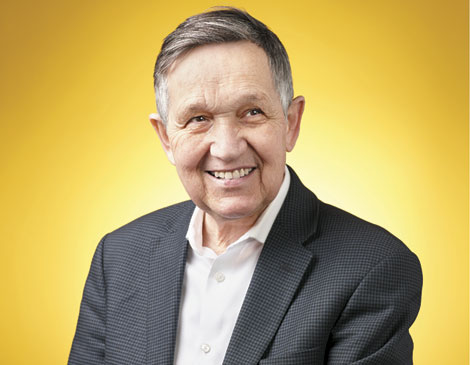Q: Why do you think you can bring some Trump voters back to the Democrats?
A: Look at the communities where he had strength in the [presidential] election. A number were people who I previously represented. They want someone who is not closely tied to political parties, who is independent. The Democrats need to bring forward a powerful program of economic reform. It was the failure of the Democratic Party on trade, on keeping us in wars, on not defending the rights of workers that opened the door for the Trump campaign. Those are issues that I’ve worked on my entire life. What I’m doing, with my running mate, is to help the party reconnect with the aspirations of working people, or union members, who feel the party has forgotten them.
Q: How do you think your platform is different than your Democratic primary opponents?
A: I have one.
Q: What policies would you pursue that would be different from theirs?
A: Everything. Let me give you an example. I’ve long been involved in efforts to protect water quality. For numerous reasons, including fracking, deep injection wells, and poorly regulated oil and gas drilling in Ohio, there is a direct threat to fresh water, surface water and ground water. The greatest benefit we have from living in Ohio, particularly Northern Ohio, is access to the largest fresh water supply in the world, through the Great Lakes. This is taken casually by other candidates. It’s frankly alarming.
Q: You’ve proposed free college tuition, universal health care, restored local government funding, a jobs program in infrastructure and more. How are you going to pay for it all?
A: The tax laws of the state have been changed to accelerate the wealth of the state upwards [to the wealthy] through various tax breaks and tax concessions. To me, you start to reestablish [different] priorities. The state still has the capacity to issue debt to do infrastructure. Beyond that, as governor, my leadership will be to work to take this to the people and gather support for a massive public works program to put Ohioans back to work in good paying jobs.
Q: Some Democrats say your comments about Trump on Fox News — like your praise for his inaugural address, your skepticism about the Russia investigation and doubt you’ve cast on intelligence agencies’ findings that Russia tried to interfere with the 2016 election — are not what Democratic voters want to hear.
A: Anyone who would confuse me with the president doesn’t know anything about either of us. I’ll put my record of 16 years in Congress on international matters against anyone. I’ve led the effort to keep America out of wars. I’m very aware of forces within the government who make money at wars. It’s precisely because of my foreign policy experience that people will have in me a governor who understands the world.
Q: Others say it’s a bad idea given Vladimir Putin’s record of human rights abuses, alleged involvement in assassinations and invasion of parts of Ukraine.
A: Please. Those people who want to create war between the U.S. and Russia do not have the interest of the American people at heart. They have a very narrow economic interest, to make money, [as] in the Cold War. I went through the Cold War when billions of dollars were wasted. We have to stop people who are in the State Department, the CIA and the Pentagon from undermining the interest of the American people. Our interests are health care for all, education for all, jobs for all. It’s precisely because of my understanding of the dynamics of international government, the politics of statecraft, and of national, state, regional and local issues, [that] I’m fully prepared to be governor of Ohio. Good luck to the other candidates, but frankly, they have to put a few more years in, in different positions, to have the experience I have.
Q: You’ve pledged to start a state consumer protection bureau. If that’s an issue for voters, why should they vote for you and not Richard Cordray, the former attorney general and former head of the federal consumer protection bureau?
A: I was responsible years ago for getting then-Mayor [Ralph] Perk to establish the consumer affairs department in the city of Cleveland, which still exists today. I have a long established advocacy on consumer matters, which includes putting my career on the line to save the municipal electric system in Cleveland because it offered electricity at a savings.
Q: Tell me how the work you’ve been doing in last five years, since you left Congress, is relevant to being a good governor.
A: I’ve been writing a 600-page book on the battle over Muny Light, and the history of it, and my term as mayor. The TV work I’ve done, I’ve demonstrated a capacity to take the positions I took in Congress and to reach a wider audience. I’ve continued to communicate an understanding of the world and a structured approach to gathering information, which is essentially for anyone who wants to be a leader.
Q: You’ve proposed a peaceful communities program for Ohio. What specifically would it do?
A: [It would] take an organized approach to dealing with violence in our communities, beginning with domestic violence, spousal abuse, child abuse, violence in the schools, gang violence, gun violence, racial violence, violence against gays and police-community engagements.
On the educational side, you introduce ethical principles of conduct that have to do with teaching respect. Violence is a learned response. So is nonviolence.
This society’s a lot tougher for people, on people. If you tapped the abilities of social workers, psychologists, teachers, negotiators, you start to create a change, slowly but surely, and empower people.
This is an extended version of an interview that ran in the April 2018 edition of Cleveland Magazine.


